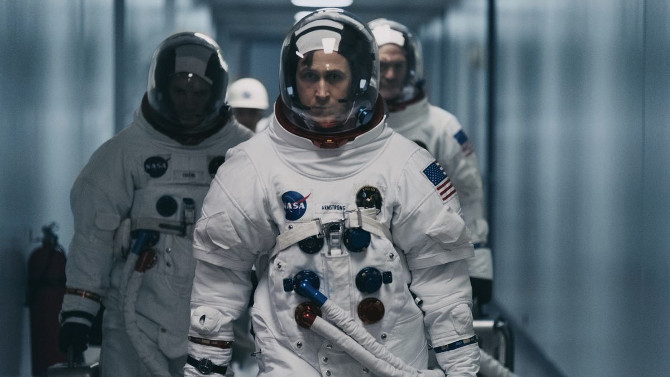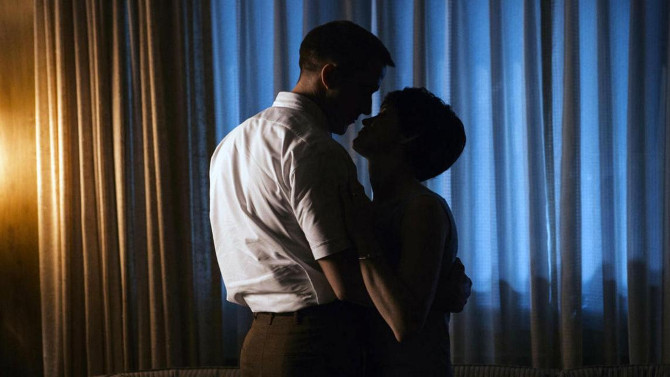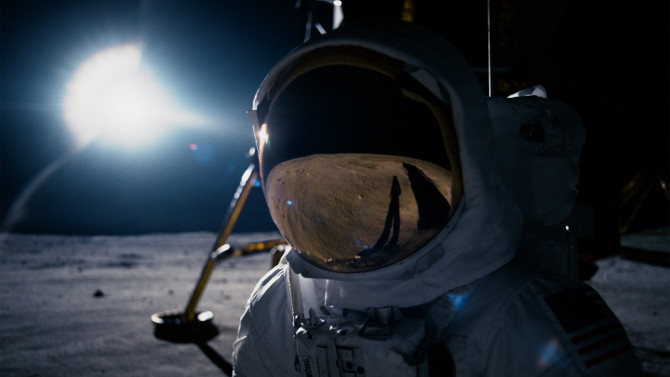Could First Man finally be the film that brings Ryan Gosling that elusive Oscar? With two nods (for La La Land and Half Nelson), and countless other memorable roles that could have earned him more chances (think Lars and the Real Girl, Blue Valentine, Drive, and The Ides of March), Gosling has re-teamed, in short order I might add, with his La La Land writer/director, Damien Chazelle, for another perfect vehicle (one might call it a rocket) to showcase his acting chops – a fascinating Neil Armstrong biopic.
Chazelle’s first directorial effort not to revolve around music (also, the screenplay does not come from him, rather Josh Singer), instead, he shoots for the moon. Gosling plays Armstrong, a man who has his own personal troubles. Married to Janet (Claire Foy), they have two children. . . one of which has cancer.
Losing their daughter, they look for a new start, Armstrong able to procure a job with NASA after an intense interview. Though we all know the big picture story, Chazelle weaves his magic, the audience almost forgetting what now seems like a foregone conclusion, drawing us into the dangers and risks of such an audacious mission.
Yet, that is only half of the tale. . . for as much as the story is about reaching for the stars, it never lets us forget about the fragility of life – a deep, humbling humanity to the piece. Armstrong is not the most gregarious; a quiet, almost sullen individual – working hard while bottling up all of that deep-rooted pain and anguish inside.
Never truly confiding in his wife or any of his friends, like fellow astronaut Ed White (Jason Clarke), he attempts to find peace his own way, getting lost in his work – it is not that he does not love his wife and children, it is just the way he carries this burden. As you might imagine, it is a difficult situation for his wife. . . never knowing if her husband is coping, further struggling with the thought that he might not return from his next risky mission. She is the backbone of the family – the voice of reason, the nurturer, dealing with all the hoopla that is the media while her husband is in space.
And, as you can imagine, NASA’s Gemini and Apollo projects are not without their problems. . . dangers at every turn. With many fallen comrades, you can literally see the weight of the world on Armstrong’s shoulders, turning even more inward and reclusive as the Apollo 11 mission looms larger than life – a worldwide debate. . . is it worth the cost (human and financially)?. . . how does it fit into the Cold War complexion?. . . questions for a man who wants none of them. It is fitting then that the narrative’s concluding notes leave us with our own sets of questions. . . not simple pomp and over-joyous circumstance, but a bittersweet, open-ended note that pays tribute to the complex drama onscreen.
First Man’s dual pronged narrative equally features two very different ways of visual storytelling. Watching the Armstrong family is extremely intimate, almost as if we are viewing their home movies, while the NASA missions awe and amaze. Placing the audience in with those manned missions, we see what they see. . . the nervous walk as you’re strapped into a missile full of rocket fuel, the claustrophobia of the near black cockpit, the uncontrollable shaking of the instruments, the thrust of the boosters, everything you could ever imagine while making your way to the moon and back. Chazelle beautifully pays homage to Stanley Kubrick’s 2001: A Space Odyssey several times, most evidently in one sequence – a waltz-like piece of music (written by composer Justin Hurwitz) resembling “The Beautiful Blue Danube” plays as Armstrong docks two separate ships in orbit as part of the Gemini 8 mission – the first time this has been done, like its predecessor, it captures the beauty of movement in space. Likewise, the moon landing is its own spectacle. . . intriguing visuals, unbelievable sound design (as the hatch is opened on the moon, it is almost like the oxygen in the theatre is released in one great whoosh), and a fitting human touch from Armstrong makes for a pure cinematic treat that is best experienced on the biggest screen possible.
Though music is not the main player in this motion picture, Chazelle still finds nuanced places for it – a soothing song from a father’s imperfect voice, a tune from long ago that brings a couple together once more for a dance (it makes an appearance later on as well), while Hurwitz’s subtle score pieces everything together nicely.
With stellar performances (Gosling and Foy are early frontrunners for Academy Award nominations), the supporting cast also deserves mention. . . quality turns from Kyle Chandler, Corey Stoll (the much more vocal Buzz Aldrin – almost the antithesis of Armstrong), Shea Whigham, Ciarán Hinds, Pablo Schreiber, Olivia Hamilton, Lukas Haas, and, as mentioned above, Jason Clarke, each bringing their real counterparts to vivid life. . . finding their place in Chazelle’s solid biopic – a film that, despite its successes, feels a bit more distant than his earlier works (understandable, as it is not written by him, nor does it relate to the two very passionate stories he told previously – though don’t let this keep you away from this picture). So take one small step for First Man, it’s one giant leap for cinematic kind.



